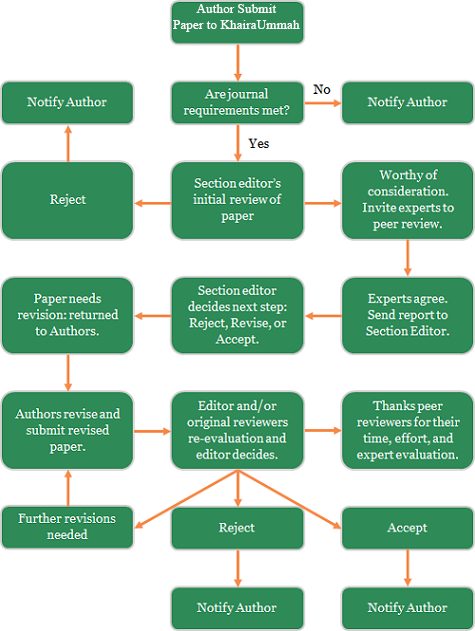Review Process
Table of content
 Description
Description Peer Review Process
Peer Review Process Editor Decision
Editor Decision Galley proof
Galley proof
Description
Publisher complies with the Committee on Publication Ethics Guidelines for Peer Reviewers which provides a comprehensive guide to the ethics of peer review.
Each submission is checked for suitability when received by the editorial board, and may be rejected without review if it is outside the scope of the journal, is obviously of insufficient quality, or is missing important sections. So, make sure the manuscript to be submitted is in accordance with the Author Guidelines.
khairaummah uses external experts to help evaluate articles and assist the editors to make a decision. Editors will be suggest at least a reviewer without the author's name and other identifying data. The reviewers will examine the feasibility of the manuscript. Peer review is carried out by double-blind review to ensure objectivity in assessing the feasibility of the manuscript.
Authors are encouraged to suggest suitable reviewers, but the Editor-in-Chief and the editorial office reserves the right to select different reviewers. The reason for asking authors to suggest reviewers is that they are best placed to know who is an expert in the field. In addition, the suggested reviewers may be suitable for other articles on the same topic. Therefore, obtaining these names can help the editorial office to ensure that it is approaching suitable people to review all articles.
![]() Initial Review by Section Editor
Initial Review by Section Editor
Before the manuscript is sent to the peer reviewer, the Section Editor will first conduct an initial review, whether the submission has followed the journal guidelines or not. To that end, here are guidelines for editors:
- Editors should deal with any papers assigned to them in a timely fashion.
- Editors should endeavour to handle all papers assigned to them, irrespective of the paper’s subject area, and the return of a paper to a Section Editor for reassignment should only be exceptional. Section Editors try to assign papers appropriately but also to balance loads on individual editors across the Editorial Board; sometimes the assignment of a paper whose scope is outside that of the assigned editor is unavoidable.
- Editors should provide written feedback to authors as regards any decision made even if that decision apparently follows obviously from reviewers’ comments, in which case one or two sentences summarising the reviewers’ comments is appropriate.
- Editors should monitor the performance of peer reviewers and take steps to ensure this is of high standard.
- Editors must pay close attention to the implementation of the double anonymized peer review process.
![]() Peer Review Process
Peer Review Process

Editor Decision
Editors’ recommendation to accept or reject a paper for publication should be based on the peer reviews and their own view on the paper’s importance, originality and clarity, the study’s validity and its relevance to the remit of the journal. Editors can recommend to immediately reject a paper if the material does not meet the standard of khairaummah. Editors should not reverse a decision to accept a submission unless serious problems are identified with the submission.
The Editor-in-Chief will make a decision of:
Decline Submission
This means that the submission has not passed peer review and is unsuitable for further consideration in Jurnal Pengabdian Kepada Masyarakat Khaira Ummah. The Editors may be rejected the submission without review if it is outside the scope of the journal, is obviously of insufficient quality, or is missing important sections.
Revision
This will require the Authors to make changes to the manuscript. Authors are asked to modify their manuscript in light of comments received from reviewers and editors and to submit a new version for consideration within 2 weeks of receiving the decision letter. A point-by-point explanation of how comments have been addressed must be supplied with the revised version of the paper. Revisions may undergo further peer review and papers may undergo more than one round of revision. If the authors do not revise their papers to the satisfaction of the editors, the paper can still be declined from publication in Jurnal Pengabdian Kepada Masyarakat Khaira Ummah.
Accept Submission
This means the submission is accepted for publication in Jurnal Pengabdian Kepada Masyarakat Khaira Ummah with or without peer-review process by external experts and can proceed to the copyediting. Submissions may be accepted without external peer review (only an initial review by the editor) when the manuscript is deemed very feasible. After final checking in the editorial office, acceptance is confirmed and the paper is forwarded to the publishers for publication.
Galley Proofread
The author has the opportunity to proofread the galley within three days of receiving the message. Correction must be restricted to printer errors. Once everyone is satisfied, the submission is scheduled for publication in a future issue.












